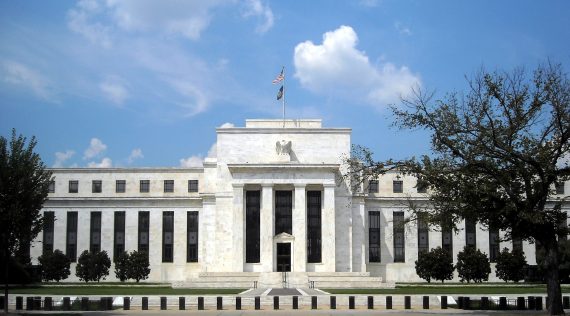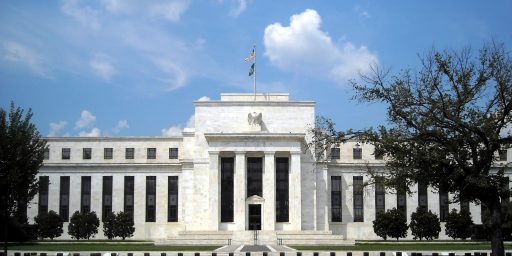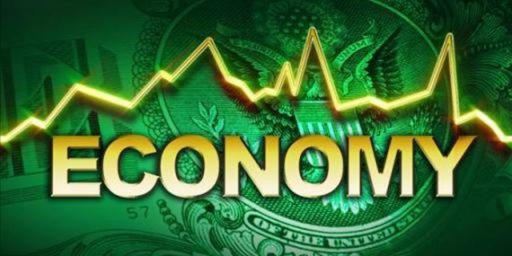As Expected, Federal Reserve Raises Interest Rates For Second Time In Ten Years
The Federal Reserve Board raised interest rates for only the second time in a decade, but it still seems like it's chasing an inflation monster that doesn't exist.
Keeping with expectations, the Federal Reserve Board concluded its final Open Market Committee meeting of the year with an announcement that it was raising a key borrowing rate for the first time in a year:
WASHINGTON — Citing the steady growth of the American economy, the Federal Reserve said Wednesday that it would increase its benchmark interest rate for just the second time since the 2008 financial crisis.
The widely expected decision moves the Fed’s benchmark rate to a range between 0.5 percent and 0.75 percent, still a very low level by historical standards.
In announcing the decision, which followed a two-day meeting of the Fed’s policy-making committee, the central bank gave little indication that the election of Donald J. Trump has altered its economic outlook. The Fed said it still expected a slow economic expansion, and it still expected to continue a slow march toward higher rates. Fed officials said they expected to raise rates three times in 2017.
The Fed’s statement Wednesday said “that the labor market has continued to strengthen and that economic activity has been expanding at a moderate pace since midyear.”
The decision was taken by a unanimous vote of the 10 members of the Federal Open Market Committee, the first time in recent months the Fed has acted by consensus. The Fed is holding rates at low levels to support economic growth by encouraging borrowing and risk-taking. The committee’s statement said it judged that the economy still needed help.
The Fed’s economic outlook was essentially unchanged from the last round of forecasts in September. Fed officials continued to predict the economy would expand at an annual rate of about 2 percent for the next few years. They expect little further decline in the unemployment rate, which stood at 4.6 percent in November. Inflation, meanwhile, is expected to reach 2 percent — the pace the Fed regards as healthy — and then stay there.
It is a Goldilocks forecast. Not too hot, not too cold — just right.
Fed officials predicted they would raise the Fed’s benchmark rate a little more quickly in the coming years, reaching 2.1 percent by the end of 2018. In September they had predicted that it would reach 1.9 percent by the end of 2018. The new projections, however, still reflected a significantly slower pace of increase than Fed officials predicted last December, when they expected the benchmark rate to reach 3.3 percent by the end of 2018.
The combination of steady growth and faster rate increases implies that Fed officials expect to offset a modest increase in fiscal stimulus.
The November elections have complicated the Fed’s outlook. Republicans will control the White House and both chambers of Congress next year, setting the stage for significant changes in fiscal policy after years of gridlock.
Mr. Trump has promised to increase economic growth through measures like tax cuts and infrastructure spending.
The Fed has said that it expected to slowly increase its benchmark rate so long as the economy continues its own slow-and-steady expansion. If Republicans succeed in invigorating economic growth, however, the Fed is likely to raise rates more quickly. The greater the stimulus, the faster interest rates are likely to rise.
“Your expectation should depend very little on what you think that the F.O.M.C. is thinking and very much on your view of Trump policies and their macro effects,” said Jon Faust, an economist at Johns Hopkins University and a former adviser to Janet L. Yellen, the Fed chairwoman. “Don’t focus on the Fed. As James Carville regularly reminded the other Clinton on the campaign trail: It’s the economy, stupid.”
The economy, for now, keeps plodding along. Steady job growth has reduced the unemployment rate to 4.6 percent, a level the Fed considers healthy. A little unemployment is natural as people move among jobs and businesses open and close. Several Fed districts reported emerging labor shortages in the central bank’s latest compilation of economic reports, published in November. In the Philadelphia district, construction workers are hard to find. Atlanta reported a shortage of nurses; Kansas City, truck drivers; in Dallas, tech workers.
Ms. Yellen and other Fed officials have said they see some signs of stronger wage growth. Inflation, too, has picked up a little in recent months. Yet both wages and inflation continue to rise more slowly than the Fed wants.
As was the case a year ago when the Fed last raised interest rates, this move was not at all surprising. Board members had been telegraphing this move in public remarks for the past several months, for example, as had the Board itself in the statements it released after each of it meetings over the past eleven months. In fact, when the first interest rate hikes in a decade were announced last December, the Fed made it clear that their intention was to raise interest rates on a quarterly basis throughout 2016 and then reevaluate its position the following December. As it turned out, though, no such action was taken largely because the economic data released over the course of this year showed that the economy was far less vibrant than the Fed projected it would be a year ago and the obvious concern was the raising rates under those circumstances would only serve to further slow growth to the point where we could tip over into a slight recession under the wrong the wrong circumstances. Fortunately, that didn’t happen but, at the same time it can’t be said that the economy was exactly in excellent shape over the course of the past year. Economic growth remains at a relatively stagnant rate compared to other post-recession periods that we’ve experienced since the end of World War Two, for example, and jobs growth, while positive, has not exactly been stellar.
Given all of this, one has to wonder, as I have in the past as we’ve come to one of these FOMC meetings and await an announcement on interest rates, that the Federal Reserve is being just a bit premature in raising rates. There is, after all, little evidence that inflation, the problem that plagued the economic for a decade until Paul Volcker’s Federal Reserve used drastic cutbacks in the money supply to slow down the rate of inflation until it was finally tamed, is anywhere near being a problem either in the next year or the foreseeable future. Additionally, if we do suddenly start getting signs of inflation, then the Fed will be free to act quickly enough to likely fend off a return of higher inflation. The counter-argument to this is that waiting until we actually see inflation to act could cause the Fed to have to raise rates so quickly that they push the economy into recession, but it strikes me that this is counter-intuitive. If we start seeing increased signs of inflation, the odds are that it would be accompanied by increased economic growth such that we would be able to absorb the shock of increased rates over a shorter period of time. As things stand, the Fed seems to be deciding that the economy is already growing too fast, something that would surprise many Americans:
“Apparently Fed officials think the economy is growing too quickly,” said Ady Barkan, the director of Fed Up, a coalition of liberal groups that is pressing the Fed to continue its stimulus campaign. “I doubt you can find many other Americans who share that opinion. And it’s a strange conclusion to draw in the wake of an election that was so heavily impacted by voters’ economic discontent.”
This is indeed the case and it will be interesting to see if the Fed does indeed go forward with its plan for future interest rate hikes, or if we will see a repeat of the past year with economic data causing the Board members to hold back from an action that seems premature to say the least.





sounds like “confidence” in our knew prez- something the economy didn’t have the last 8 yrs. , and i was under the impression that the stock market would tank if trump won……i guess “tank” doesn’t mean what i thought it did…….
@bill:
Give it time. Remember who was in office the last time the economy crashed?
And remember whose regulation and subsidies it was that lead to a slow but steady recovery?
Wait don’t answer. You probably don’t, seeing as you live in an alt-right dreamworld.
And if things go wrong, will you blame your Businessman-God? No, you’ll lick his loafers, like the good little small-minded serf you are. Just because he told you he hates people you hate.
The unemployment rate is down to 4.6 percent. The economy is approaching full employment.
Wage growth rates are back to 2008 levels.
The inflation rate is 1.6%, close to the 2% inflation target.
Those indicate that a rate increase is appropriate at some point in the near future. One can debate whether this should be the exact time to do it, but there isn’t much cause to delay it for much longer.
I find it fascinating that the markets have been reacting since the election, climbing on the expectation that after eight years of trying austerity, the GOP shows every sign of reverting to Reaganonomics/Bushonomics: cutting taxes and stepping on the spending accelerator. Of course, it would be sound financial management to spend (particularly on infrastructure) when interest rates are negligible, but I suppose that’s too simple-minded for our national leadership.
I find it odd that this is considered so drastic. The economy is fine. Is it great? no. Is it bad? no. So why should the fed funds rate remain at near zero? A slow rise from 0 to say 2% is not catastrophic. 2008 messed us up so bad that we have become paranoid. It is not a rapid rise.
A lot of the market rise is bank stocks, which will benefit from higher spending and higher interest rates. Investors are betting, reasonably, that cut loose from fear that it might benefit a
blaDemocratic President, Republicans will deficit spend likeRepublicansdrunken sailors. Looks to me like the Fed has the same expectation.There’s a chance some of the spending may be productive, like infrastructure, but mostly it’ll be barren tax cuts for the 1%. (Forgoing revenue = spending for these purposes. Giving tax breaks to private companies to build toll roads is barren spending.) So any boom will be temporary and it’s probably prudent for the Fed to start building the ability to cut rates in the bust. In any case, the Fed is a creature of the banks, and the banks want higher rates. The Fed has to give at some point.
There are many parts of the country that are seeing a slow recovery from the recession. This move of the Federal Reserve seems to be the wrong action at the wrong time for them. The housing construction in this area is just now starting to get going again.
Here are some reasons that this may not be the time to raise interest rates:
home buyers may decide to back out. Any time “interest rates are going up” is heard it sends fright into potential home buyers. I realize that we are not talking about 10% + mortgage rates like many of us went through in the ’70’s. But this could be the first in a series of steps.
Those considering refinancing to a lower rate will think – not worth it.
Other interest rates may go up: car loans, credit cards (already too high), personal loans. This could discourage consumer spending.
Higher interest rates could have adverse effects on a person’s credit ratings.
The Federal Reserve is not giving clear explanations on why this is justified. This decision should be presented openly to the people. Congress should be in on this. The FR should not be just given a rubber stamp or blank check.
The FR meetings should be open to the public. There should be a complete audit of the FR. (What about it, Senator Warren ? You’re against these big, powerful banks).
See: Federal Reserve secrets.
@Tyrell: One of the reasons we have the economy we do is because the Federal Reserve is INDEPENDENT.
The last thing we want is Congress poking their fingers in the pie. Can you think of any circumstances under which they would approve raising rates?
@Tyrell: @grumpy realist: Legally Congress has supervisory responsibility over the Fed. The last thing Congress wants is taking any responsibility by exercising that control.
@Tyrell:
All of this angst over moving the Fed’s benchmark rate to a range of 0.5 percent to 0.75 percent?
You are aware that the Fed pulled the rate down to historical lows in order to further enable activity in the financial and credit markets, and support recovery from the worst financial collapse since the Great Depression? Recovery has been steady since 2009, the Fed’s objectives have been realized.
You also realize that many observer have been complaining that sustained low interest rates have not been good for people who cannot be invested in equity markets, so this modest step begins to change that dynamic too.
I do not want Congress – especially this Congress – to be involved in any more of the operations and functions of the Federal Reserve than it is now,
a one-quarter of one-percent increase – 0.0025 – in the interest rate?
@al-Alameda: No, actually he doesn’t. You can tell that because he is still calling for a complete audit of the Fed after someone showed him the website where one can go to see a complete audit of the Fed.
His google–“Federal Reserve secrets”–is another giveaway, The next one will be when he starts recommending that people buy gold.
@Tyrell:
You really need to stop reading crap like this.
@Lit3Bolt: so you’re admitting that obama has been in complete charge of this meh economy for 8 years now? that’s a start, but not reality anyways. that the fed kept us on life support for the duration should be very telling of how they thought of him and his policies.
i guess you’re one of those who think the president actually runs the country- you’re not alone but definitely not correct. you probably think bill clinton balanced the budget….right?!
@al-Alameda: Then we are in agreement. Small raises can be handled. But if becomes a trend, then we need to beware. I remember a mortgage rate I had: 8%; and I thought it was low at the time. We also must avoid the high inflation and high unemployment of the 70’s: a perfect storm of economic calamity.